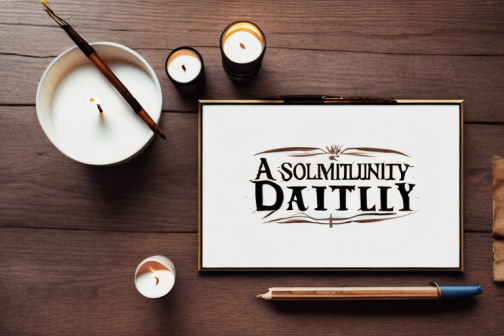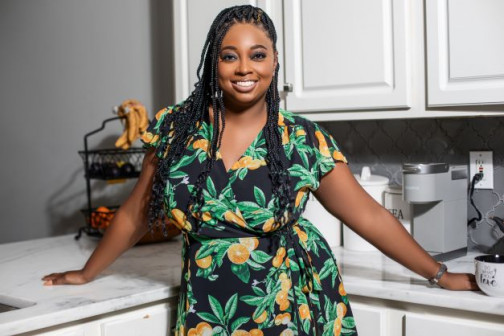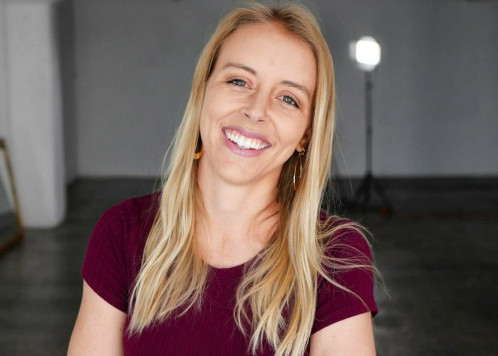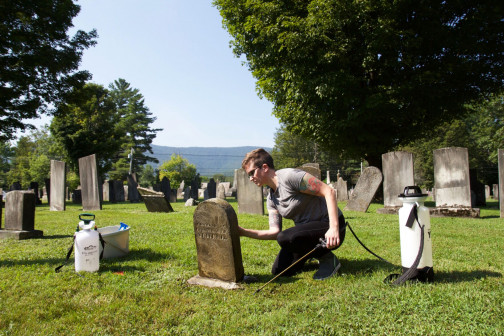Caitlin Abrams wants to preserve not just the resting places of those who have gone beyond, but their stories as well.
Taphophilia is defined as a passion and enjoyment for cemeteries and the rituals of death. It often involves visiting and photographing cemeteries and graveyards, reading epitaphs, researching death rituals and the lives of those who have died. We spoke to Caitlin Abrams, a Vermont tombstone tourist and self-described taphophile who took it one step further. Since 2020, she has been cleaning gravestones as a hobby. She told us all about it, along with how she became an instant TikTok sensation with 2 million followers and counting.
Please share a bit about your background. How does it relate to you becoming a gravestone cleaner?
I grew up in New England, where cemeteries are just part of the landscape. I had grandparents on both sides that were deep into genealogical research and who shared their knowledge with me. I think certain people connect with history and genealogy more than others, and when you share that passion, cemeteries represent a natural progression--after all it's essentially an open-air museum, and there are countless stories there that may have been forgotten for centuries.
Cemeteries allow you to engage with history in a very physical way. In the last few years especially, I was spending a lot of time researching stories and symbols in cemeteries, and cleaning felt like the next logical step. I wanted to give back and contribute to the history of these people.
We heard you identify as a taphophile, a person that has a passion for cemeteries. When did this passion start and how did you decide to make it such a big part of your life?
I've been fascinated with cemeteries for as long as I can remember. I love exploring them, piecing together stories with the hard facts of dates, names and familial relationships. It's an easy, free hobby that is readily accessible.
Additionally, I am a childhood cancer survivor, and I lost my best friend to cancer at 9. There weren't a lot of ready answers for me at that time, and I think in a way I've been seeking out answers amongst the dead since then.
When did you start cleaning gravestones?
I received a photo request through the website FindaGrave in early 2020. I took a picture of the grave, which was nearly unreadable, and the requestor asked if I could possibly clean it. It was winter, when cleaning isn't really possible, so I spent a few months researching. I cleaned my first grave in May 2020.
How did you come up with the idea of sharing it on social media. And why TikTok?
About a year after I cleaned my first grave I heard about other grave cleaners on TikTok. I had been sharing stories and cleaning on Instagram and hadn't really considered another medium. Originally I resisted TikTok because I'm 35 and thought I might annoy the Gen Z-ers! But eventually I realized that short videos were the perfect medium for me to share information, especially as I have a background in training development.
What was the first video that went viral on TikTok?
I cleaned the grave of a little boy named Silas Reed, and I believe it's still my most-viewed video. I'm not sure what it was about that one, but people really connected with it.
Why do you think people are so drawn to your videos?
I think different people get different things out of my content--some people just like the cleaning and how satisfying it is. Others enjoy hearing the stories. I spoke to a graduate student in history who told me that the general trend in history in modern times is to focus on the "bottom-up" vs. the top-down approach that has mostly comprised history up to this point. People are interested in the little details about people's lives that you wouldn't read about in a book, and hearing about the diseases and circumstances they dealt with puts a lot of things into perspective.
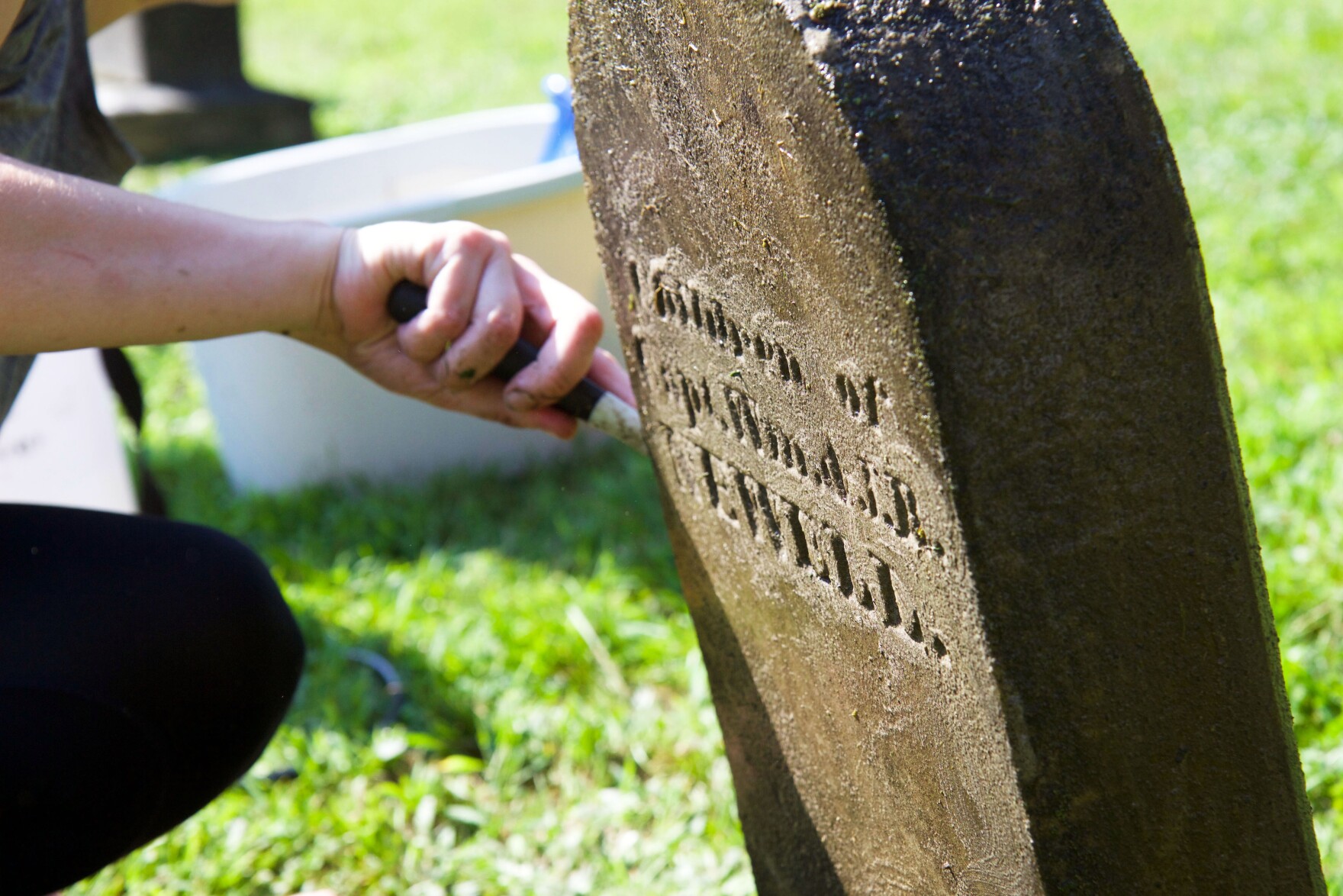
We understand that the process of cleaning a gravestone involves quite a lot of steps and specialized products to achieve the beautiful final work that you show in your videos. How did you learn all that?
I did a ton of research online. I also joined my local cemetery association and got their advice before assembling my kit. These days there are a million resources on how to clean safely which is great!
How many hours a week do you spend cleaning gravestones?
It's winter here now so I won't be cleaning until spring. But during "cleaning season," I was usually at the cemetery 5-10 hours a week.
How do you decide which gravestone to clean next? What’s your process?
I like to say that the graves pick me! I find myself particularly drawn to the graves of young women and children. Otherwise I walk around and let them "call out" to me.
Do you have a personal favorite epitaph or story behind a gravestone cleaning that you would like to share with us?
My favorite epitaph ends with "Death's a debt to nature due, that I have paid and so must you." Dark!
In terms of stories, I recently cleaned the grave of a railroad engineer who struck three children during his career, though none were hurt. He himself died in a horrible train crash leaving his wife alone with several children.
What do your family and friends think about this beautiful hobby you have? Do you like to share it with them?
They are very surprised with how big it got, and especially how fast it happened. A lot of them reach out to tell me that someone else in their life was talking about my TikTok and got excited when my family or friend said they knew me personally.
Do you have any exciting new ideas for the future of your social media stardom?
There were a few feelers sent out to me about a TV show which I would love! I'd also love to write a book.
What do you find inspiring about death?
It's cliché at this point, but death is the great equalizer. It's something that has always been with us and always will be with us. In a lot of ways it is what connects us to our shared past. Death rituals are omnipresent throughout history and tell us so much about how people live and view the world.
What are some of the challenges that you’ve encountered while gravestone cleaning?
The D2 solution that I use is the gold standard and there are no other accepted alternatives. It's a very pricey product and since I'm a volunteer, the costs add up!
You help preserve and honor the lives of those who have died. Have you thought about what you would like to do with your own body once you die? If you had to plan for yourself, what would you include in your Farewelling celebration? You know, the 5 things that are most important to you? We call that the “Farewelling 5.”
Oh I love this! I would like to be buried because I'd like my body to live on for awhile so archeologists can dig me up some day. I guess 5 things that are important to me for a ritual or event would be:
1. Family - chosen and not chosen :)
2. Fun - I really want people to find a way to laugh and have a good time as much as possible
3. Humanism - I am an atheist and want no religious component to my Farewelling. Along those lines I want it officiated by someone that knew me, if possible!
4. Good food - I have celiac disease and can't eat gluten. I want there to be as much gluten as possible when I'm dead.
5. Simplicity - If possible, no embalming, and a simple wooden box.
To watch Caitlin doing what she loves the most, follow her on TikTok @manicpixiemom
Photo Credits: Elodie Reed/Vermont Public Radio

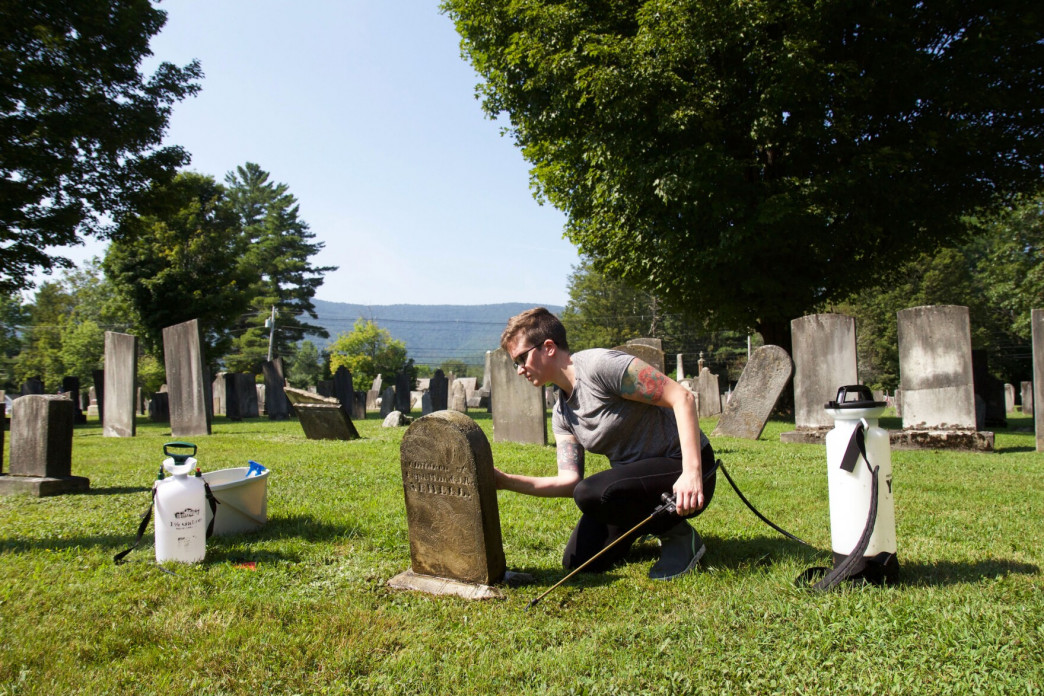
-banner.png)


